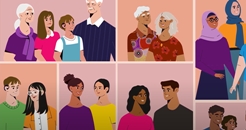 What is family?
What is family?
From research by the Australian Institute of Family Studies (AIFS)
Defining ‘family’ is not straightforward. While the legislation in various contexts provides definitions of family and relationships and outlines obligations and entitlements, the way individuals experience and understand family in their day-to-day lives can be very different.
How people define family and decide who is included in their kinship circles is influenced by these legal definitions but also shaped by culture and personal life experiences and circumstances. People may also have multiple definitions of family and group these into different sets of people with different values and functions – for example, their ‘birth family’, their ‘in-laws’ or their ‘chosen family’.
Cultures, values, social expectations and laws have all changed over time and vary from place to place. For example, while marriages and families were once guided by, and created through, obligation and tradition, today relationships are increasingly shaped and defined by love, satisfaction and individual choices.
In research by AIFS, love and unconditional non-judgemental support had universal agreement as being important in defining what makes a family. Across the entire sample, as well as each generation and group analysed, these 2 characteristics were the most likely to be chosen as important or very important.
In contrast, while there was much more variation in views on the importance of blood and genetics, and legal ties or obligations; overall and in each generation and group analysed, these more traditional definitions of family were the least likely to be rated as important or very important.
Love and support are central aspects of relationships with ‘chosen family’ and are often the reason why people are selected to be in one’s ‘family’ alongside, or sometimes instead of, people related by blood or the law.
More than half of the participants in this study (52%) included pets as a part of their family. Like chosen family, recent research suggests that animals can play an important role as confidantes and offer people a place of non-judgemental safety and unconditional love.
What makes a family? Participants answered as either ‘important’ or ‘very important’:
-
Love (95%)
-
Unconditional, non-judgemental support (92%)
-
Shared values, beliefs and traditions (70%)
-
Common experiences and activities (57%)
-
Blood/genetics (34%)
-
Legal ties or obligations (31%)
Men were more likely to rate blood and genetics as important. Women were more likely than men to consider love as very important.
Who is included when you think about family?
-
Children (85%)
-
Sibling(s) (79%)
-
Parent(s) (76%)
-
Partner or spouse (63%)
-
Pet(s) (52%)
-
Grandparents (49%)
-
Chosen family or close friends (42%)
-
Grandchildren (39%)
-
Parents-in-law and other members of partner's family (35%)
Watch this 1 minute video:
Read the full article and report here.
Retweet about this article:
From research by the Australian Institute of Famil, 17/04/2024